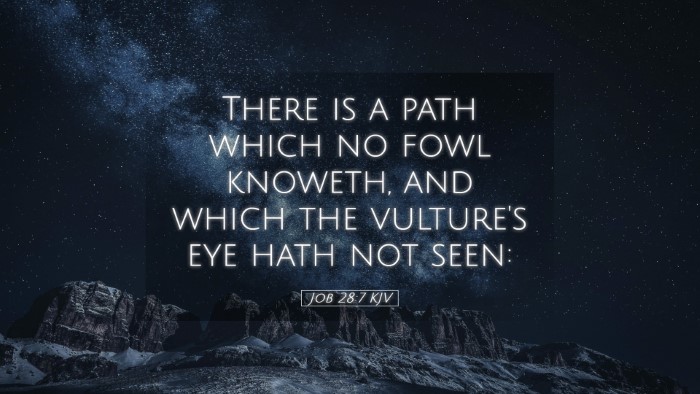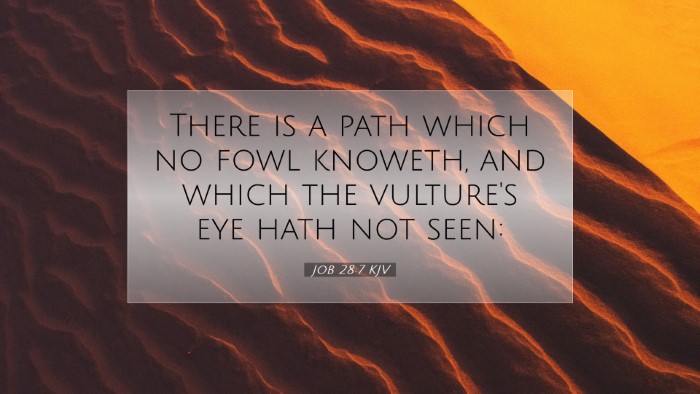Old Testament
Genesis Exodus Leviticus Numbers Deuteronomy Joshua Judges Ruth 1 Samuel 2 Samuel 1 Kings 2 Kings 1 Chronicles 2 Chronicles Ezra Nehemiah Esther Job Psalms Proverbs Ecclesiastes Song of Solomon Isaiah Jeremiah Lamentations Ezekiel Daniel Hosea Joel Amos Obadiah Jonah Micah Nahum Habakkuk Zephaniah Haggai Zechariah MalachiJob 28:7
Job 28:7 KJV
There is a path which no fowl knoweth, and which the vulture's eye hath not seen:
Job 28:7 Bible Commentary
Commentary on Job 28:7
Job 28:7 states: “There is a path which no fowl knoweth, and which the vultures' eye hath not seen.” This verse introduces an important theme in the book of Job—the pursuit of wisdom and understanding that transcends the natural realm. Below is a summary of insights and interpretations drawn from various public domain commentaries including those of Matthew Henry, Albert Barnes, and Adam Clarke.
Contextual Overview
The verse is situated within a discourse on wisdom, where Job reflects on the elusive nature of wisdom compared to material treasures. His lament emphasizes that while one can mine silver and gold from the earth, true wisdom is sought in the depths, beyond the reach of earthly methods. The imagery of birds and vultures highlights the distances and depths to which human understanding does not extend.
Key Themes
- The Elusiveness of Wisdom: Both Henry and Clarke note that this verse depicts wisdom as something that is not just hidden, but inaccessible to many forms of earthly perception. Foul and vultures, representing the highest of creatures in the sky, cannot see this path, underscoring the idea that wisdom is beyond even the keenest observers.
- Symbolism of Birds: Albert Barnes conveys that birds, which typically soar high and have vast vision, are unable to discern this path. This points to a spiritual truth that wisdom requires divine revelation, and is not merely an intellectual pursuit.
- Human Limitations: Job’s assertion reflects the limitations of human understanding. As Henry elaborates, while humans can explore many facets of the natural world, accessing the true depths of wisdom requires a higher level of insight and is often beyond human comprehension.
Commentary Insights
Matthew Henry's Insights
Matthew Henry emphasizes the profundity of God’s wisdom and the futility of human efforts to grasp it through mere observation. He suggests that the natural world is full of mysteries which are meant to humble humanity. Henry elaborates that although mankind is endowed with knowledge, there are realms of understanding that they cannot penetrate, a truth reflected in the limits of their pursuit for wisdom.
Albert Barnes' Analysis
Albert Barnes discusses the metaphor of the “path” as representing the journey of discovering wisdom which is not afforded to the superficial observer. He outlines that the verse not only suggests the invisibility of this path to creatures like vultures but also hints at the necessity of a divine guide in approaching true wisdom. Barnes stresses that wisdom, in biblical terms, is closely aligned with a relationship with God, framing it as more valuable than earthly riches.
Adam Clarke's Reflections
Adam Clarke provides a contextual framing that links the idea of the “hidden path” to the covenantal relationship between God and mankind. He comments on the divine wisdom that governs the universe, asserting that only those willing to transcend their limitations through faith can attain true understanding. Clarke also elaborates that this search for wisdom should be understood in the light of humility and reverence for God.
Theological Implications
This passage raises significant theological implications regarding the nature of wisdom and its relationship to God. It challenges the reader to reflect on their own assumptions about knowledge and invites a deeper inquiry into how wisdom is understood in the light of divine revelation.
- Revelation and Insight: The insights gathered underline the idea that wisdom is a gift from God, not merely an intellectual accomplishment. It necessitates a heart and mind open to divine truth.
- The Respect for Mystery: Understanding that there are paths unwitnessed and truths unrevealed fosters a respect for the mystery of God’s creation and governance of the world.
- Encouragement for the Search: The pursuit of wisdom, though challenging, is encouraged throughout the Bible; this verse exemplifies the need for perseverance and the reliance on God’s guidance.
Practical Applications
For pastors, students, and theologians, Job 28:7 serves as a reminder of the importance of relying on God for wisdom. Here are some practical applications derived from this verse:
- Pursuing Wisdom through Prayer: Engage in prayer to seek divine wisdom rather than relying solely on human knowledge.
- Emphasizing Humility: Foster an attitude of humility in learning, understanding that there are profound mysteries in God’s creation.
- Creating a Culture of Wonder: Encourage congregations to embrace wonder and awe in their faith journeys, acknowledging the limits of human understanding.
Conclusion
Job 28:7 encapsulates a profound truth about the nature of wisdom, calling readers to reflect on their own understanding and approach to the divine. Through the insights provided by Henry, Barnes, and Clarke, we are reminded that while wisdom may be elusive, it is not unattainable through the right means—namely, through seeking God and trusting in His limitless understanding.


